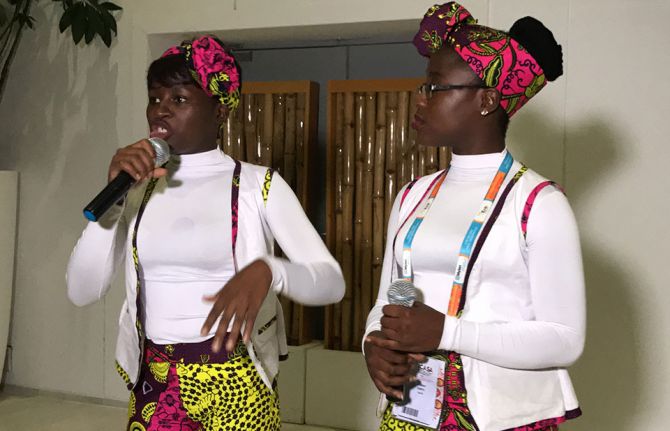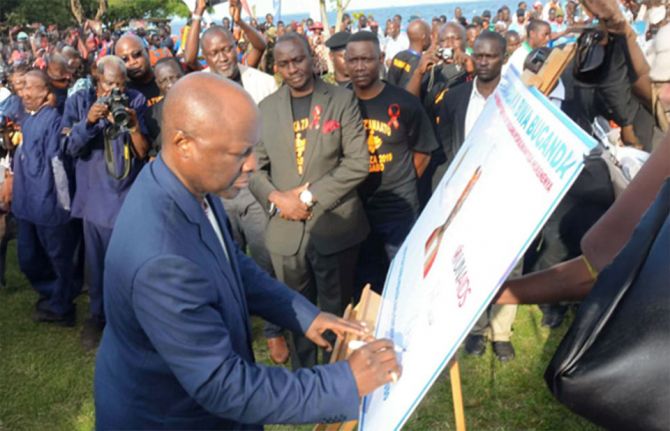

Feature Story
The moment of truth in breaking down barriers
27 February 2018
27 February 2018 27 February 2018When Robinah Babirye was at boarding school, her secret was difficult to hide. Sleeping in an all-girls dormitory, everyone knew everyone else’s business, especially around bedtime. “It was hard to bring out my medicine,” she said. “It would raise questions.”
Ms Babirye and her twin sister were hiding their HIV-positive status. Before starting at boarding school, the daughters and their mother would take their medicine daily at 10 p.m., and that was all there was to it.
Once she enrolled at university in Kampala, Uganda, in 2013, hiding became more difficult. Her room-mate was suspicious and spread rumours. Having been born with HIV, she couldn’t help feeling that life was unfair.
“At the time, I hadn’t accepted that I was living with HIV and that I had to live with it for the rest of my life,” said Ms Babirye. She described years and years of avoiding ever speaking to anyone about her regular visits to the clinic or about taking treatment. Then her mother died from cancer and she didn’t know how to cope.
Glancing above her eyeglasses, she added, “When I saw my mother fighting, it gave me strength, but when she died that became a terror.”
Ms Babirye more or less gave up. She stopped taking her medicine and drifted.
Asia Mbajja, founder and director of the People in Need Agency (PINA), a nongovernment organization for young people living with HIV in need, described appeals from distraught teenagers. She had helped many of them as children while working as a treatment coordinator at the Joint Clinical Research Centre children’s clinic.
“I kept promising them that life would change and get better, but as they grew up, their needs changed,” she said. “I needed to do something that would make a difference.”
In 2012, Ms Mbajja quit her job to start PINA. Among her first clients was Ms Babirye, whom she has known since the age of 10. She hammered over and over the importance of taking the daily dose of antiretroviral therapy.
“The problem is that all of Asia Mbajja’s upbeat encouragement would come tumbling down once she was no longer around,” Ms Babirye said. The young woman felt defined by HIV.
“When you're told that you have to take medicine for the rest of your life, coupled with the rumours and stigma, I feared I would forever be stuck,” she said. “Despite living with HIV, I am still a woman with feelings.”
Through her involvement with PINA, in 2014 Ms Babirye travelled to the International AIDS Conference in Melbourne, Australia. The young woman felt elated to discover a world where her status seemed a non-issue, but upon her return she couldn’t help feel like there was a line she could not cross.
Ms Babirye felt tired. She wavered between ending her life and changing her life for good.
Donning an I am HIV Positive t-shirt she posted a photograph of herself on Facebook. “My heart started to beat so fast, I couldn't bear to see the comments,” she said. She paused and let out a gasp and said, “I was expecting a lot of negativity, but the comments were largely positive.”
Her twin sister, Eva Nakato, couldn't believe what she had done. After some thought, she decided she couldn’t let her sister fight alone, so she also disclosed her status.
“When people said we need more people like her it motivated us,” said Ms Nakato.
One of the first people to congratulate the twins was Ms Mbajja. Ever since, the duo have been at the forefront of PINA, testifying, mentoring and singing. Ms Nakato explained that at the children’s clinic they used to sing as a group, and at PINA they brought it to a whole new level.
“We started using music to convey HIV awareness messages," she said. Songs like Never Give Up, Yamba (Help) and ARV. Their latest projects now include launching a television series around HIV and relationships and documenting gender-based violence.
“When we met survivors of sexual abuse, that pushed me to make a movie,” Ms Nakato said, adding that videos and music can get messages across.
Ms Babirye finished her university degree last year and dreams of independence.
In the long term, she said her vision is a generation that is AIDS-free and stigma-free. “To accomplish an AIDS-free world, each individual has a responsibility to do something and break down cultural and societal barriers,” she said.



